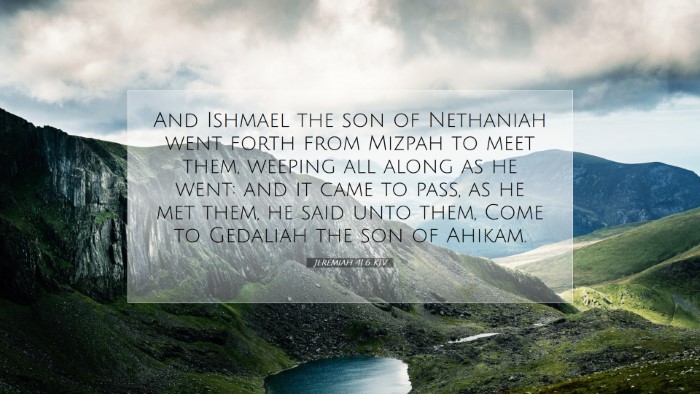Commentary on Jeremiah 41:6
Verse Translation: "And Ishmael the son of Nethaniah went forth to meet him, weeping all along as he went: and it came to pass, as he met him, he said unto him, Come to Gedaliah the son of Ahikam." (Jeremiah 41:6)
Contextual Overview
This verse occurs in the context of the chaotic aftermath of Jerusalem's destruction. Gedaliah, appointed governor over the remnant of Judah, becomes a focal point of hope for the people left behind after the Babylonian exile. Ishmael, a member of the royal family, represents the tensions within the remnants of Jewish leadership and their response to the changing political landscape.
Commentary Insights
1. The Character of Ishmael
Matthew Henry highlights the duplicitous nature of Ishmael. While he approaches with tears and feigned grief, his true intentions are treacherous. This juxtaposition illustrates a broader theme in Scripture: appearances can be misleading. Ishmael’s weeping serves as a metaphor for those who cloak their malice under the guise of sorrow. This hints at a significant theological insight—God often uses the complexities of human emotion and intention to work out His divine plans.
2. The Significance of Weeping
Albert Barnes elaborates on the act of weeping as a common expression of grief and distress in the ancient Near East. Ishmael's tears could be interpreted as reflecting the loss and devastation faced by the people of Judah following their exile. In pastoral ministry, this detail serves as a reminder of the need for empathy and understanding in moments of communal grief.
3. The Invitation to Gedaliah
Adam Clarke provides insights into the significance of Gedaliah’s name—"greatness of Jehovah." The gathering under Gedaliah symbolizes a gathering of hope amidst despair. The invitation extended by Ishmael to seek Gedaliah is filled with irony, as it sets the stage for the subsequent betrayal. This also highlights the biblical theme of seeking Godly leadership in times of crisis. Churches today can draw from this lesson: the importance of discernment in leadership choices, especially when the stakes are high.
Historical Interpretations
Jeremiah 41:6 not only serves as a narrative development but also as a historical commentary on the nature of leadership in post-exilic Jewish society. The dynamics presented here echo through centuries of Judeo-Christian thought about kingship, divinely appointed leaders, and the perils of political unrest.
- Divine Sovereignty: The unfolding events illustrate God’s control over history, even through human rebellion and treachery.
- Warning Against False Piety: Ishmael's actions remind us to beware of those who may present themselves as friends while pursuing harmful agendas.
- Leadership in Crisis: The call to Gedaliah is a reminder that wise leadership is crucial, and the community's response to it can shape their collective future.
Theological Implications
The verse encapsulates several theological themes vital for the understanding of God’s covenant people. The emotional state of Ishmael symbolizes the internal conflicts within the nation and, by extension, within the Church today. As believers, recognizing the signals of betrayal disguised as benevolence is essential for maintaining the integrity of the community.
- Grace and Judgment: The weeping of Ishmael indicates a façade of grace in the face of impending judgment due to his treachery.
- Community and Isolation: The community's survival depended on their ability to recognize true leadership and support one another, paralleling the church's need for unity today.
Pastoral Applications
For pastors and leaders, Jeremiah 41:6 serves as a crucial insight into the nature of leadership amid turmoil. It encourages vigilance and discernment in dealing with others who may not have pure intentions.
- Be Watchful: Understanding the motives behind actions is significant, especially in leadership roles.
- Empathy in Ministry: Grief can manifest in various ways, and pastoral care should encompass a deep understanding of the people’s emotional states.
Conclusion
Jeremiah 41:6 serves as a rich source for reflection on the human condition, leadership failures, and the need for genuine community amidst treachery. The insights drawn from public domain commentaries emphasize the enduring relevance of Scripture in guiding contemporary Christian thought and practice.


